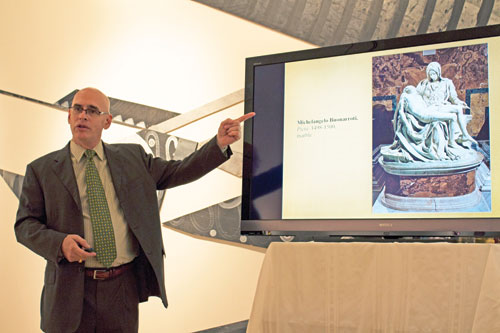
Last week’s lecture at the Triton Museum of Art on “To Kill a Mockingbird” could be summed up in one sentence: the book is about the reader. On Oct. 10, Chief Curator Preston Metcalf led another lecture on an important piece of literature and how that book is reflected in art and society. Although the book he chose was not one to take lightly, Metcalf willingly delved into the depths of Dante’s “Divine Comedy.”
While the “comedy” is one of Metcalf’s favorite books, he readily admits that it’s difficult to read. Not only is the subject matter tough, but finding a proper translation that captures both the rhythm and beauty of the poetry is difficult.
After an overview of Dante’s life, including his exile, which inspired him to write the 14,233-line poem, Metcalf got into the details about Dante’s trip through the death and destruction in hell, the not-much-better purgatory and the practically perfect paradise.
During Dante’s three-day trek through hell, the reader is presented with disgusting sights and tormented souls. He then visits purgatory, the place for those who aren’t quite bad enough for hell, but haven’t been given access to heaven. Finally he sees paradise. And then, the patterns come into play. Dante is Harry Potter. He is Neo from The Matrix. He is Luke Skywalker. He is Jesus. He is Gilgamesh. He is every character, fictional or not, who has seen evil and survived. He is the reader.
“If Dante could make that journey, then why couldn’t you?” said Metcalf.
And, there it is. Yet another great work of literature is not about the subject, but the reader. It’s about one’s own life and what one needs to do to be successful. It’s also to help the reader realize that everyone is connected.
“Why do we read Dante today?” Metcalf asked. “Because it’s our story…As soon as you understand that you are reading poetry, and poetry is a metaphor, and the metaphor refers to the journey of an every man, then you are guided to understand that it’s about us. You are intended to put yourself in the place of Dante…It’s about us…all of these great stories, when you break them down to their core elements, the thing that makes them last is that they have a universal goal – to reach us as individuals…And what do I learn from Dante? I learn that I am supposed to come to the realization that we’re connected.”
On Oct. 17, the Metcalf will discuss “Walt Whitman’s Leaves of Grass and the Conscience of American Art.” The Triton Museum of Art is at 1505 Warburton Ave. across the street from City Hall. Lectures begin at 7 p.m. Drop in fee is $20. Visit http://tritonmuseum.org/education_adults_arthistory.php for more information.
